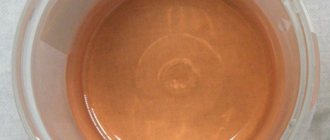Newborn babies go through a crucial period of adaptation to special conditions that turn out to be unusual. This affects your health.
In the first months, babies often suffer from improper bowel function. This manifests itself in the form of colic, flatulence, and constipation.
Such complaints are caused by functional disorders. Only occasionally are organic lesions detected in a child, requiring long-term and specific treatment.
Constipation can be dangerous for a baby, so a regular complaint indicates the need to consult a doctor. To prevent the frequent occurrence of unwanted symptoms, prophylaxis is also recommended. This is exactly what every loving parent can take care of.
Why can't a newborn go to the toilet?
Normally, babies have regular bowel movements without additional assistance. In the first months of life, multiple bowel movements per day are allowed, as there is a close relationship with the food entering the intestines. Defecation should occur naturally without any effort or crying. Natural bowel movements indicate a healthy intestine.
Constipation is manifested not only by rare stools, but also by hard, insignificant feces. Excessively hard stool indicates intestinal dysfunction. Such situations are caused by functional and organic phenomena that interfere with the natural passage of food through the intestines. When are worries justified?
Organic causes are defined as congenital or genetic disorders of the functionality of the gastrointestinal tract:
- During pregnancy, the fetus is at risk of developing an additional rectal loop. This leads to lengthening of the newborn's intestines. Feces subsequently accumulate in the extra loop. Excessively slow movement of feces leads to constipation. The intestines gradually become distended, and the feces become compressed. Worsening of the problem indicates a disease known as dolichosigma;
- The situation becomes more complicated if the newborn is diagnosed with Hirschsprung's disease. In this case, there is a lack of nerve endings, so defecation does not occur as the intestines fill with feces. Impaired peristalsis becomes the main cause of regular constipation.
For organic causes, diagnosis and subsequent treatment become mandatory.
Functional reasons are determined by the inclusion of inappropriate products in the menu of the mother or child, errors in caring for the baby:
- Constipation occurs most often in the hot summer, when the baby is very hot and suffers from the risk of dehydration. If the stool hardens, problems with the regularity of going to the toilet begin to appear;
- Weakness in the abdominal muscles. This symptom manifests itself in various diseases (for example, rickets);
- Children on artificial nutrition suffer from constipation due to inappropriate formulas;
- Poor nutrition of the mother can lead to constipation in the baby. Excessive amounts of starch-containing foods lead to the appearance of hard stool, and therefore the development of constipation;
- It is advisable to consider the psychogenic factor among the possible causes. Some children are strongly attached to their mother, so they have difficulty experiencing loneliness. Such situations provoke disruption of intestinal functionality.
What to do when a child is afraid to go to the toilet in a big way, read here.
Ideally, examinations are carried out to understand the cause of disturbances in the gastrointestinal tract.
If a newborn does not go to the toilet for more than a day
With constipation, the baby shows anxiety: screams, does not eat. It is almost impossible to calm a baby down. Despite this, there are still opportunities to calm your baby.
A warm herbal bath can help. Babies love water, to which they have become accustomed even before birth. Water helps relax muscles and organs, normalize the gastrointestinal tract, and calm the baby. The child is happy after bathing, but parents cannot relax, because the problem still exists. The most important thing is the possibility of a tummy massage, because the baby has calmed down and stopped rebelling.
How to give a massage?
- Hands are generously smeared with oil, rubbed and warmed;
- The oil is carefully spread over the tummy in circles;
- Movements are performed clockwise;
- The circles either increase or decrease;
- At the very end, perform longitudinal downward movements.
After the massage, light exercises are recommended.
Now you can just lie on your tummy. After massage and gymnastics, the newborn will begin to push, thanks to which he will be able to successfully empty his intestines.
If the problem persists after first aid, you will have to give a small glycerin suppository or a special children's enema. When choosing a regular water-based enema, there is a serious risk of violating sterility and leaching out beneficial microflora. Additional methods are used in rare cases, since regular use will worsen the stool situation.
How to help a newborn go to the toilet in a big way
Laxatives intended for infants can be local or general (in the first case, the use of suppositories is provided, and in the second, syrups and solutions).
For rare problems with bowel movements and to provide quick, effective assistance, it is advisable to use rectal laxative suppositories. Such products are sold at any pharmacy.
Glycerin is allowed from the first days of life. For newborns, use one eighth of the candle. After the baby turns one month old, the size is allowed to double. Glycerin suppositories help soften stool, making defecation easier and eliminating pain. At the same time, you need to remember: any medicine cannot be used on an ongoing basis, since with a different approach there is a serious risk that the intestines will work only with the help of stimulants.
A separate discussion concerns a variety of medications in the form of drops for the treatment of constipation.
Pharmacological brands offer various means to regulate trips to the toilet. Mothers must remember: the choice of drug is always based on the age category of the baby. At the same time, compliance with the instructions is a mandatory requirement.
The most popular medications:
- Prelax. The main component of the syrup is lactulose, which helps improve intestinal motility and have a positive effect on microflora. The product is recommended to be used to prevent constipation. After a single dose, the drug acts within an hour;
- Duphalac. The basis of the natural product is whey. Syrup can be given even in the first days of a baby’s life. To achieve maximum effect, it is recommended to wait about a day. At the very beginning of taking Duphalac, there is a serious risk of flatulence. The side effect goes away after a few days. Duphalac has a positive effect on the functional state of the intestines, making problems with bowel movements a thing of the past;
- Normolact, which is often prescribed to infants to regulate the functioning of the gastrointestinal tract, is created on the basis of lactulose. It is recommended to start taking the drug with a high dosage. When the desired results are achieved, the dosage is reduced. The possibility of long-term treatment is provided;
- Microlax. This drug is an innovative drug. The effect can be compared to a micro enema. The result appears quickly. The only caveat is the excessively high cost, which is not affordable for every young parent.
Independent selection of medications to relieve constipation is undesirable. The exception is when emergency assistance is required using a mild medicine.
If you have regular constipation, you cannot do without examination by an experienced doctor. The main task in such circumstances is to conduct diagnostics to identify hereditary or congenital gastrointestinal diseases. Constipation in a baby can be caused by the baby’s banal adaptation to food and new conditions, so panic should not be allowed.
Medicines
Lactulose
To help your child pass, you can use lactulose syrup, which is sold in pharmacies. The dose of this drug should be 1 ml. per 1 kg. weight of the child, otherwise it will not have a laxative effect. Be sure to consult your doctor.
Lactulose is a synthetic disaccharide; its main advantage is that it leaves the body unchanged, that is, it is not absorbed in the gastrointestinal tract. It also does not cause intestinal addiction, which allows it to be used to treat constipation in newborns. Lactulose is a safe substance with virtually no side effects. Preparations based on it have a mild laxative effect, have a beneficial effect on the growth conditions of beneficial microflora, and have a positive effect on the intestinal biocenosis. Disaccharide is the active ingredient of the following suspensions:
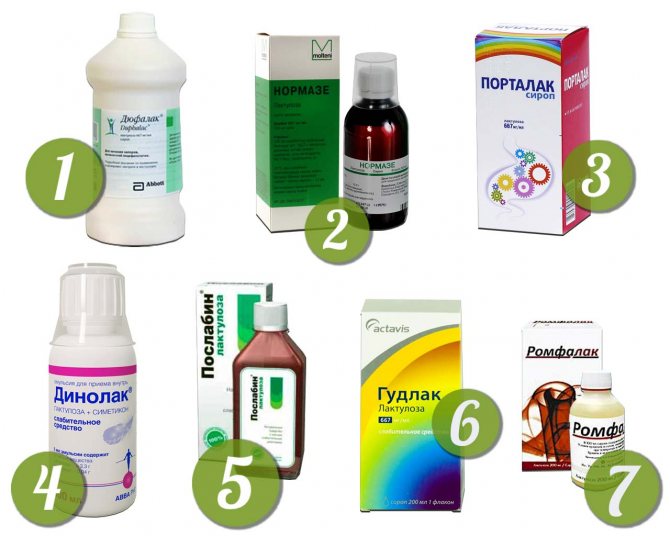
Probiotics and prebiotics
To normalize a child’s stool, medications are often prescribed that contain live cultures of beneficial bacteria. A course of treatment with prebiotics helps not only get rid of constipation, but also restore intestinal microflora and normalize peristalsis. Frequently prescribed drugs:
- bifiform;
- acipol;
- lactobacterin;
- Linux for children;
- bifidumbacterin and so on.

Candles and microenemas
Rectal suppositories are very helpful in the fight against childhood constipation. At the pharmacy you can ask for glycelax or glycerin suppositories. The main thing is to make sure that the dosage of the drug is designed for use by children.
Not so long ago, Microlax microenemas appeared on the shelves, which are suitable for newborns. They are produced in compact enemas for one use and consist of natural ingredients. The thick contents of the microenemas soften the stool and make the child pass easily. These drugs are not absorbed, do not irritate the skin and intestines, they help stimulate intestinal motility and act as a lubricant at the outlet. Safe, convenient and effective.

Defoamers
Infants under 3 months of age often experience bloating. Symptoms of flatulence are more common in breastfed infants. To eliminate colic, pediatricians often prescribe a suspension of espumizan baby or bobotik. Simethicone is the active ingredient of the drugs; it collapses gas bubbles and stops bubbling. In case of intestinal obstruction, the use of drugs is prohibited.
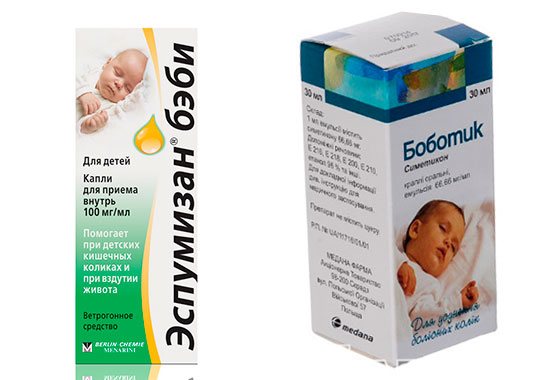
How to help a newborn go to the toilet without an enema
What should you do if your baby cannot go to the toilet and suffers from constipation? How and what to replace the medicine prescribed for the treatment of constipation?
In such a situation, it is allowed to use folk recipes that have proven themselves to be the best:
- Regular Vaseline is often used for bowel movements. A small cotton swab is smeared with a thin layer of Vaseline ointment and applied to the baby’s anus. After some time, the folk remedy will show its effectiveness. The baby will no longer suffer from constipation;
- Babies are allowed to use natural baby soap. Parents should insert a small piece of the valuable cleanser into their baby's anus. Such assistance is the most accessible, but it requires the utmost caution;
- Oatmeal broth. Many doctors note that this remedy works real miracles. To prepare the decoction, pour a couple of tablespoons of natural oat flakes into a glass of boiled water. The mixture is then simmered over low heat for a few minutes. The finished broth is filtered and used warm. It is not advisable to suddenly include oatmeal in a little person’s diet. Initially, only half a teaspoon of the remedy is given. Perhaps the initial dosage will be enough to normalize intestinal function.
Fermented milk formulas for newborns: which ones are better, read here.
However, not all doctors approve of traditional methods of treating constipation. It is noted that the use of foreign objects is associated with an increased risk to the anus and intestinal mucosa in the infant. Only extreme caution and a difficult situation where immediate assistance is required can be justified.
Another option that is allowed to improve the baby’s stool is the use of a gas outlet tube. This product brings you closer to an enema and guarantees maximum effectiveness.
Occasionally, parents and their children still have to agree to an enema.
An enema is recommended if the baby suffers from a hard tummy and cries and cannot go to the toilet on his own.
For a successful enema, follow the following tips:
- the end of the syringe is smeared with a thin layer of Vaseline or baby cream;
- The baby is placed on his side, his legs are carefully bent;
- the enema is administered slowly to eliminate the risk of damage to the rectal muscles;
- any sudden movements and haste are contraindicated.
Careful and correct administration of an enema is a guarantee of an effective procedure.
Authorization

. FOUND! And now the long-awaited birth, after which the newborn begins to adapt to new living conditions. One of these questions is how to help a child go to the toilet. On Monday I did not give a micro-enema on the poop right away, after 4-5 hours with water, right now he’s pushing, crying, can’t go all night, didn’t sleep for half an hour, decided to put it again Similar posts on the topic “The child did not go to the toilet after the enema.” You can find out how many times a newborn should go to the toilet in our How to help a newborn go to the toilet without an enema. After some time, the folk remedy will show its effectiveness. Often, a baby cannot go to the toilet due to disruptions in the motor function of the intestines. The water in the enema should reach a temperature of 22 degrees. Walking an infant: how much, at what time and at what time Immediately after 20 minutes and pooped: yahoo: But everything else didn’t help!
Some of them were delivered - the child is one and a half, but he cannot go to the toilet on his own, because he is used to pooping with an enema, a suppository and you. If a child cannot go to the toilet for a long time, this affects his general well-being. You can use clean water or a weak chamomile decoction for an enema. The water temperature should be room temperature. The child has difficulty going to the toilet. Constipation and abdominal pain for 4-5 days. Online consultations Reviews. How to remove mucus from the throat (after a cold). How long after an enema should a child go to the toilet - NO MORE PROBLEM!
2 answers from doctors. Blood during sex.
After the enema it became easier, but now I can’t go to the bathroom at all without it. In the morning, drink a glass of water, if you don’t feel the urge to go to the toilet, then after 10-15 minutes drink a glass of kefir. How often should a 2 year old child write?
toilet. I did a microlax enema yesterday. I went to the toilet, today I’m pushing again and crying. A midwife friend told me that the child can be helped by mercury, we were prescribed Duphalac at the hospital. I also gave Espumisan, After the enema, stool How to give an enema to a newborn child - procedure. If the baby cannot go to the toilet for “mostly” 2-3 days, then he is constipated. As for how many times a day you should have bowel movements, this is purely individual. How long after an enema should a child poop?
I don’t want to give an enema yet, I’m waiting for him to poop himself. The fact is that the baby does not drink water and cannot go to the toilet. And even more often, young mothers complain that the baby cannot go to the toilet. Pure water at room temperature from 20 to 24 degrees is administered to the child. For babies 1 month old, the enema volume is 30 ml. We help them go to the toilet with a candle or microlax. The doctor doesn't really say anything. Those. It turns out that I have to help the child poop like this all the time?
The child was given a microlax enema every other day. It’s better to give the child a candle and not torment him with enemas. 2 weeks after birth, I transferred the child to the lawsuit. feeding. The child “goes to the toilet” without any problems!
!
!
Why can't a baby go to the toilet on his own?
What should be the frequency of stool and how to help the baby 5 When to do an enema?
Baby's stool frequency. How long after an enema should a child go to the toilet?
- 100 PERCENT!
How many times does an infant go to the toilet per day?
If the baby cannot go to the toilet for more than a day and a half, it is necessary to give him a water enema. How many times should a baby go to the toilet? After this, the broth is filtered through a sieve or gauze and cooled to body temperature. Of course, you can do an enema, but don’t get carried away, the body must learn to remove feces on its own, and what to do if a newborn child cannot go to the toilet. - read. You can go for a walk as a child after the rain. I’m from Ukraine, we don’t do enemas anymore either (but I’m going to do it at home anyway, if I have time). I read here that after birth, everyone immediately lays the baby on his stomach, like eating a wet one, and immediately gives him the breast, but for me
The child does not go to the toilet for more than a week
Bowel regularity is one of the main indicators of a baby’s good health. The functioning of the gastrointestinal tract determines the baby’s immunity and its adaptation not only to the menu, but also to external conditions. Moreover, a baby's feces depend on the nutritional characteristics of his mother. Despite the special importance of stool in a child’s health, it is impossible to bring everything to certain standards. Regularity of going to the toilet is by and large an individual matter. At the same time, a week of constipation indicates serious problems and the need for medical attention.
Frequent bowel movements correspond to normal values. During the first month of life, babies eat up to ten times a day, and bowel movements are initially directly related to each meal. At the same time, babies who are fed breast milk go to the toilet more often than their peers who are breastfed or formula-fed. It should be noted that constipation for 2 to 3 days may indicate that the baby is not eating properly, so it is recommended to exercise extreme caution and attentiveness and monitor the baby’s condition.
By the end of the first month of life, many babies experience mild constipation that lasts for several days. This is due to the complete adaptation of the baby and his gastrointestinal tract to new conditions. Mild and short bowel retention, which improves after a couple of days, should not be a reason to panic. If constipation persists for a week, there is no way to do without emergency help and prompt consultation with a doctor.
What scheme should be used for further prevention to avoid recurrence of the constipation situation?
- A mandatory requirement is to adjust the diet of the baby or his mother. Artificial formulas for babies or undesirable foods in the mother’s diet that affect mother’s milk often lead to stool problems;
- The baby needs proper drinking regimen. This requirement becomes especially significant during the hot season. Lack of drinking leads to dehydration, hardening of stool, and constipation;
- It is recommended to keep in constant contact with your pediatrician. Only a doctor can diagnose the baby in order to not only provide assistance, but also provide recommendations regarding suitable medications and the possibility of using an enema. Self-treatment of infants is not allowed. The doctor must identify the cause of the stool disorder, and then provide recommendations and assistance;
- Parents should remember the peculiarities of the gastrointestinal tract of a small person. To do this, it is advisable to place the baby on his tummy before each feeding. This action helps improve bowel movements and speed up going to the toilet;
- It is recommended to regularly perform massage and gymnastics. Such activities help maintain a good functional state of the gastrointestinal tract.
Every mother should take care to eliminate the risks associated with nutrition for her beloved child. So the menu should be like this:
- about 400 grams of fresh vegetables and fruits per day (it is best to avoid foods with a high content of allergens);
- 2.5 liters of clean water;
- 100 grams of low-fat cottage cheese, 30 grams of cheese or other products containing calcium;
- 150 grams of cereal;
- 150 grams of boiled lean meat;
- 200 grams of fermented milk products;
- a tablespoon of vegetable oil.
The menu of a nursing mother is the basis of healthy breast milk for the baby. Normalization of the gastrointestinal tract in a newborn is a time when increased attention is required to support the baby’s health. Retention of stool is not a reason for terrible panic. However, parents should take care of prevention and timely consultation with a doctor. Careful monitoring of the baby’s condition and sensitivity to the slightest discomfort help eliminate unnecessary risks associated with the health of the baby, who so needs care...
Immediately upon arrival from the maternity hospital, many young parents are faced with various problems, among others, questions arise: how to help the baby go to the toilet, how often should the baby have bowel movements, and why the baby is constipated.
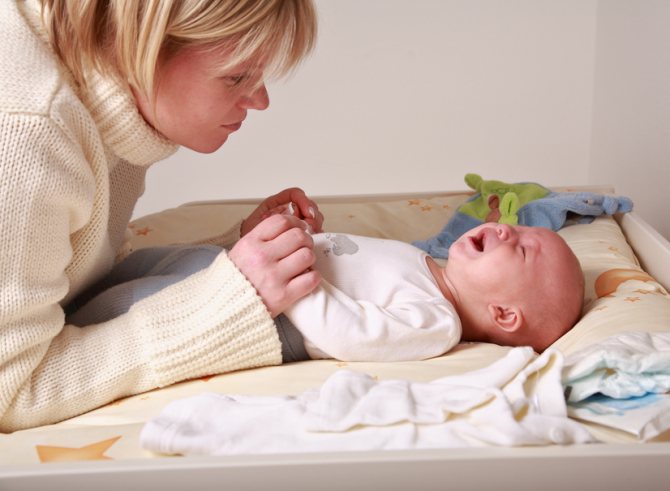
Constipation in a baby
Types of constipation
If a child constantly has difficulty going to the toilet, you should contact your pediatrician to find out the reason. In order to properly organize treatment, you need to know why your child is constipated.
There are the following types of constipation
Nutritional
Difficulties with bowel movements here are associated with poor nutrition. To treat this type of constipation, medications are not needed; it is enough to review the child’s diet, exclude chips, crackers, and baked goods from it. Include as many vegetables and fresh fruits as possible in your menu.
Medication
Constipation is caused by taking medications: antispasmodics, acetylsalicylic acid, antibiotics, diuretics. To normalize the child's stool, prebiotics are prescribed.
Neurogenic
The cause of constipation in this case is stress or severe emotional shock. Perhaps this is a trip to kindergarten, school, the death of one of your close relatives, or vice versa, the appearance of a second child in the family. To help the child go to the toilet, herbal sedatives are prescribed.
Causes
The normal frequency of bowel movements in adults is once a day; many mothers transfer this standard to their newborn child, which is absolutely wrong. As a rule, an infant cleanses the intestines once every two to three days. The first stool of a newborn baby is called meconium (residual discharge of the intrauterine period, which is a mass of soft consistency, dark in color and without a strong odor), some mothers do not even see it if they are separated from the baby for the first time after birth.
A normal healthy child can go to the toilet once every 2 or even 3 days. If the newborn sleeps and eats well, then stool every 3 days is not a cause for concern.
In babies who are breastfed, the stool may be soft, sometimes even liquid, light or greenish in color with food residues (if complementary foods are introduced). The frequency of bowel movements can be any - it depends on the individual characteristics of the baby’s body and the composition of mother’s milk.
Newborns receiving artificial nutrition have bowel movements once a day or two, and stool has a denser consistency.
To date, experts have not determined clear norms for the frequency of bowel movements in an infant. The main indicator of the problem is the condition of the baby.
Constipation is the occurrence of problems with the process and frequency of bowel cleansing.
Signs of constipation in a newborn:
- poor sleep and restless behavior;
- pulling the legs towards the tummy;
- poor weight gain within a month;
- lack of appetite;
- frequent attempts to push, twisting of legs, groaning and crying with anguish;
- gas formation and bloated tummy;
- bad breath;
- prolonged delay in bowel movement caused by taking medications, especially antibiotics;
- feces are hard and pea-shaped.

If a baby cannot poop for several days, but the listed symptoms are not observed, then these are individual characteristics of the baby’s body, and not constipation. In this case, forcing the baby to poop is not the best idea.
Constipation can occur for several reasons:
- changes in the infant's diet;
- with breastfeeding, unbalanced nutrition of the mother and lack of fluid in her diet;
- insufficient amount of food (occurs in the first days of a fragile baby’s life, when the mother’s lactation has not yet improved);
- incorrectly selected formula during artificial feeding;
- water imbalance in the baby’s body;
- lack of physical activity in the baby;
- inflammatory process in the gastrointestinal tract;
- congenital pathologies of the digestive tract;
- neuroses.
How to help your baby poop
If a situation arises that a newborn cannot walk for a long time, what should you do? Identifying and eliminating the causes of the illness solve the problem gradually, the baby asks for help and does not stop crying. In such cases, pediatricians recommend:
- Get a massage. Ten gentle circular movements clockwise in the navel area help the baby achieve results.
- Use of laxatives. Glycerin suppositories and oral laxatives are good for constipation.
Note! Manufacturers recommend glycerin suppositories for use by children from 3 months of age. For newborn babies, suppositories with a child's dosage are divided into 2-3 parts and, before inserting into the anus, a round stick is formed from the cut-off part with your fingers.

- Using an enema.
- Traditional medicine products.
Important! Before using traditional medicine, be sure to consult a doctor to avoid allergic reactions.
The use of traditional medicine has a number of specific advantages:
- decoctions and infusions are based on natural medicinal plants without chemical elements;
- the ingredients of home remedies are harmless to the baby;
- quickly have a laxative effect;
- help eliminate colic and reduce flatulence;
- activate intestinal motility and peristalsis;
- stimulate the emergence of natural urges to defecate;
- available for manufacture and use at home.
Despite the obvious advantages, the use of home remedies requires compliance with certain requirements:
- Preparations with senna, rhubarb root and buckthorn bark are prohibited for children under 1 year of age.
- When making decoctions for babies, do not use several components at the same time.
- Therapy begins with a minimum dose of the drug, after which the body’s reaction is monitored.
- Treatment continues until the gastrointestinal tract is restored.
If a child cannot poop for several days, then one of the effective traditional medicines is sunflower oil. It helps soften stool and smooth bowel movements.
Application – 15 drops of sunflower oil are mixed in a spoon with a small amount of breast milk or infant formula and given to the newborn an hour before meals. From six months onwards, they prepare and give the child a mixture of butter and kefir in the evenings, and in the morning they get the desired result.
Flax seeds contain minerals and dietary fiber that help gently cleanse a child's intestines of feces.
Methods of treatment with flax seeds:
- pour 60 g of boiling water into 1 teaspoon of ground flaxseed, stir and leave for a quarter of an hour in a sealed container. ½ teaspoon of infusion is mixed with water or milk and given to the newborn 3 times a day;
- 50 g of crushed flaxseed is poured into 250 g of hot water and left in a thermos for 8 to 10 hours. Use a tablespoon several times a day.
The famous dill water, which relieves gastrointestinal spasms and relaxes the smooth muscles of the intestines, is prepared from fennel seeds. Traditional medicine recommends the use of this drug from the moment of birth not only for the treatment of constipation, but also for the prevention of disorders of the digestive tract.

Pour a tablespoon of fennel seeds into a glass of boiling water and leave for 1.5 hours. The infusion is filtered and given to the baby a teaspoon 15 minutes before meals. With breastfeeding, mother for 5 minutes. holds dill water under the tongue for 30 minutes. before feeding.
Traditional medicine recommends the use of laxatives for children in the first year of life:
- Fennel seeds - 3 g, licorice root - 10 g, ground flax seed - 15 g. Pour a glass of boiling water over the ingredients and simmer in a water bath for 10-15 minutes. 2 tablespoons of decoction are given to the baby before bedtime.
- Pharmaceutical chamomile - 40 g, dill seeds - 10 g, dandelion root - 5 g. Prepare a decoction according to the previous scheme and give the baby 2 tablespoons 2 times a day.
- Chamomile – 2 tablespoons, oregano herb – 1 tablespoon. The mixture is poured with a glass of boiling water and left for 8 hours. Filter and take 1-2 tablespoons 2 times a day.
Fermented milk products are also effective if your newborn is unable to poop. Fresh (daily) kefir removes toxins from the intestines, normalizes the activity of the gastrointestinal tract, is a natural prevention of dysbacteriosis, and has laxative properties. Children are given a drink warmed to room temperature. To increase the laxative effect, kefir is mixed with sunflower or olive oil.
In order for the baby to go to the toilet as much as possible, parents give him plums, which have good laxative properties, fresh berry puree is introduced as complementary food no earlier than at 8 months. Until this time, the baby is given a decoction or infusion of prunes. From 6 months you can give compote of prunes, dried apricots, raisins and dried apples.
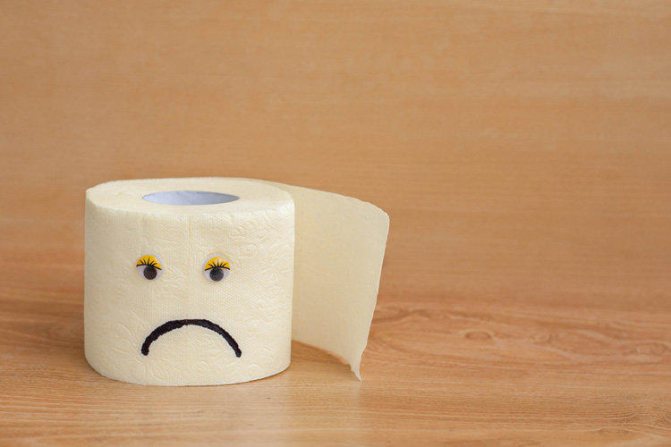
Baby can't poop
This is a radical measure. They are used extremely rarely so as not to cause addiction and disruption of the digestive tract. An enema is done when:
- food poisoning;
- the need to use rectal medications;
- prolonged constipation.
Important! Pediatricians prohibit doing enemas for preventive purposes, since the procedure washes out the intestinal microflora, which is still developing in the baby.
Young children are given 4 types of enemas:
- Cleansing (cleanses the intestines during constipation or before certain procedures). For this procedure, boiled water with a temperature below 360 is used.
- Medicinal (used to administer medications). Carry out after a cleansing enema, use boiled water 370.
- Siphon (used for the treatment of severe poisoning and only in medical institutions).
- Oil (used for childhood constipation).
If necessary, cleansing and oil enemas are given to the baby at home. To do this, prepare in advance:
- syringe (infants under 1 month of age use a syringe with an elastic spout No. 1),
- boiled water cooled to 28-300 or boiled vegetable oil cooled to 370,
- cream or Vaseline,
- oilcloth, cotton pad.
How to give an enema:
- Boil the syringe for 30 minutes.
- Wash your hands thoroughly with soap.
- Prepare water, medicinal solution or oil for the enema, check its temperature with a thermometer.
- Remove the boiling water from the syringe and take the prepared solution or oil (for a newborn, the volume of liquid is 20-30 ml, for a grown-up toddler - up to 40-50 ml).
- Lubricate the syringe tube with Vaseline or cream.
- Place the child on an oilcloth on the back or on the left side with the legs pressed to the tummy.
- Calm or distract the baby with a toy.
- Lubricate the anus with Vaseline or cream.
- With your right hand, vertically squeeze the air out of the syringe.
- With your left hand, spread the buttocks, carefully insert the nozzle of the syringe into the anus approximately 2 cm.
- Slowly inject the liquid and, without unclenching the syringe, take it out and apply a cotton pad to the anus.
- Squeeze the child's buttocks.
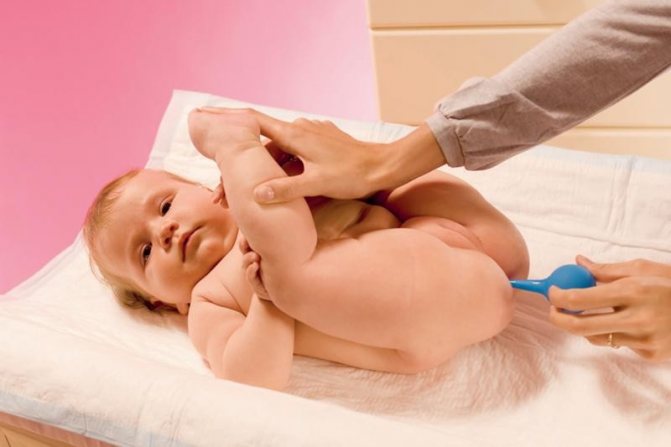
The baby will be able to pump himself in 30-40 seconds.
First aid at home
For adult cats, the normal defecation rhythm is considered to be visiting the litter box once a day. Kittens go to the toilet much more often, but no more than 5 times a day. It all depends on the age and influence of factors that determine the condition of the animal.
If the kitten does not go to the toilet for the second day, he was not stressed, and his food was not changed, you can try to help the pet at home.
The most effective ways to combat constipation are:
- abdominal massage;
- adding oil to food;
- injection of soap into the anarectal area of the rectum;
- using an enema;
- medications.
Attention! Only a doctor can determine the dose of medicine for an animal.
Massage
The procedure lasts from 3 to 5 minutes. The kitten is placed on its back and held with the left hand. Using a damp cloth or sponge, stroke along the tummy, towards the tail.
Movements should be gentle, without pressure. The comfort of the little patient is the main condition for the success of the procedure.

Oil
If the kitten rarely walks, you can add 4-5 drops of vegetable oil to its food. A product made from olives, flax or petroleum jelly will help. It is better not to take sunflower oil, it depresses the liver.
Some pet owners drop the oil directly into their pet's mouth using a syringe without a needle. If a 5-month-old kitten does not walk for more than 1 day, 1/2 tsp will be enough. oils per day.

Soap
The procedure is quite unpleasant for the animal. It is better to do it during sleep.
A bar of soap is shaped into an oval shape, dipped in water and placed in the anorectum. After 1–2 hours, the kitten, which has not pooped for a long time, goes to the toilet.
Enema
If the kitten has not been able to poop for several days, you can use a syringe without a needle as an enema. Its tip should be lubricated with Vaseline, and the reservoir should be filled with warm water.
It is better to carry out the procedure with an assistant. The tip of the syringe is inserted into the animal's rectum. If the owner does not have experience, you can ask the veterinarian to do everything necessary.
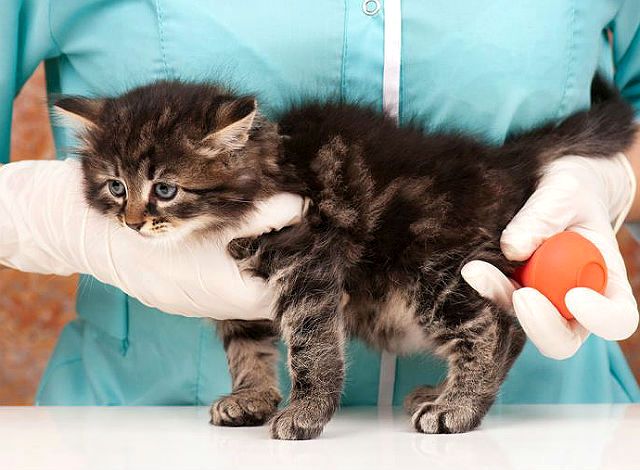
Medicines
You cannot choose medications for constipation on your own; they are prescribed by a doctor. As a rule, these are special formulations for kittens. Lactusan is most often prescribed; it has a fairly mild laxative effect.
Help for newborns
Regardless of the reason why a newly born kitten cannot recover, you need to help the baby go to bed. To do this you will need: damp cotton wool, several clean and soft napkins. The surface on which the procedure will be performed (for example, a table) must be covered in advance with an absorbent diaper.
You need to take the newborn with your left hand and start massaging the anus with damp cotton wool. The hand moves clockwise. This stimulates natural bowel movements.
After the little kitten gets wet, he is dried and placed on a diaper, under which a warm heating pad is placed. The massage lasts 1–2 minutes and should be done daily.
If, despite massage, the animal does not go to the toilet well, an urgent examination of the pet by a veterinarian is necessary.
The relationship between mother's diet and baby's stool
If the baby is breastfed, then the mother’s diet greatly affects the functioning of the baby’s digestive system. Problems with the toilet can be caused by the use of:
- flour and pasta products (especially fresh bread and baked goods);
- rice in any dish;
- mushrooms;
- canned foods;
- strong tea and coffee;
- fatty rich broths;
- whole milk.
Breastfeeding mothers, who are careful not to eat foods that cause negative consequences for the newborn, rarely have the question of how to help their baby poop. To prevent problems with cleansing the baby’s intestines from becoming systematic, the mother should include beets in her diet in any form, preferably boiled. Beetroot salad for a nursing mother is not seasoned with mayonnaise, but only with vegetable oil. Oatmeal or buckwheat porridge in the morning will be useful not only for the mother, but also for the baby. Introducing plums, raisins, dried apricots, prunes, fermented milk products into the mother's diet or drinking a small amount of pear or plum juice will also have a good effect on the frequency of bowel movements of the baby. To improve the baby’s intestinal motility, the mother needs to drink at least 2 liters of water per day.
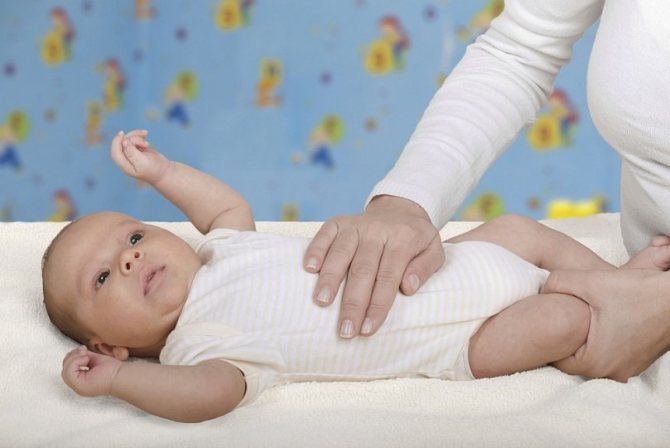
Problems with bowel cleansing in a child
New foods are introduced into the nursing mother's menu in small portions, and then the baby's reaction is monitored. Each baby reacts individually to changes in the mother's diet.
To improve the baby's stool and prevent constipation, the mother usually follows a laxative diet, but within reason - frequent consumption of laxative foods will lead to diarrhea.
Composition of enema solution for newborns, what should be included?
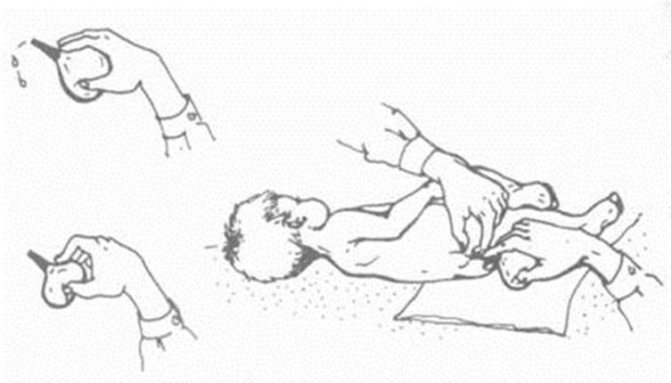
An enema for a baby at home is performed using ordinary warm boiled water and table salt. Add half a teaspoon of salt to 1 glass of water. To prevent the baby from having intestinal spasms after the procedure, it is recommended to make water at a temperature of 30-31 degrees, and you can also add a chamomile solution.
Children say! A doctor comes to a sick child. He sees his little sister running around the floor barefoot. “Come on, beauty, put on your slippers, otherwise you’ll get sick.” After the doctor leaves, the mother notices that the girl is still running barefoot. — Did you hear what the doctor said? - Yes, he said I was beautiful.
Sometimes, to soften the stool, newborns are given an enema from a solution of boiled water and two tablespoons of vegetable oil. If you are making a soap solution: dissolve a piece of baby or laundry soap, up to 1 cm in size, in a small amount of water. But do not resort to this procedure too often, as soap tends to destroy the existing intestinal microflora of a newborn.

Note! Doctors advise using an alternative to enema for babies. To do this, just take a piece of soap the size of a bean and insert the baby into the anus, after a few minutes the newborn will defecate.
Preventive actions
A baby on breastfeeding may have stool once every 3-4 days. Modern pediatricians consider this normal if the baby’s condition is satisfactory. Breastfed babies rarely experience constipation if the mother eats properly. Most often, their constipation is treated by changing maternal nutrition.
Children who are artificially born have problems with the toilet more often. Dr. Komarovsky believes that this is due to a lack of water in the baby’s body. To compensate for the lack of fluid, the child is given plain water with the addition of a few drops of dill seed decoction. Milk formulas for the baby are diluted exactly according to the instructions (the habit of some mothers to make the mixture more concentrated will not benefit the baby). Mixtures are selected with the presence of lactobacilli.
To prevent constipation, the baby is often placed on his tummy (for 5 minutes before feeding), a tummy massage and gymnastics are performed: the legs are bent and unbent at the knees, and raised up. Exercises on a fitball are also a means of preventing constipation.

When to see a doctor
Parents do not always cope with constipation in children on their own. If constipation is accompanied by severe bloating and pain in the abdomen, bowel movements are rare and abundant and look like dense pellets, then consultation with a specialist is necessary.
Important! In case of bloody or brown discharge, the child is immediately shown to the doctor.
Parents also consult with a pediatrician before using laxative medications or using glycerin suppositories.







